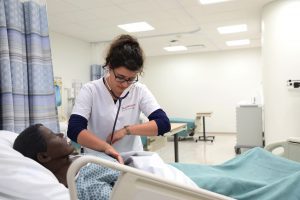By: Felipe Rivas

2 min read April 2020 — As the coronavirus reduced daily activity to only essential services, educational institutions were forced to transition at a moment’s notice into a virtual setting as shelter-in-place measures and social distancing became commonplace. Entire curriculums, testing, labs, and even physical education in some cases, transitioned into an online classroom setting as teachers and students of all grade levels resumed their education under the COVID-19 pandemic.
These risk-management decisions stressed and challenged the infrastructure of universities, colleges, and schools throughout the nation, while at the same time creating opportunities for innovation in the educational landscape. Although fully online classes are a temporary measure to slow the spread of COVID-19, and as local, state and national governments consider what a reopened economy may look like, educational systems alike are being forced to mitigate the challenges and innovate their educational practices and offerings via learning innovation and digitalization.
In the Philadelphia region, Neumann University transitioned quickly into an online learning setting thanks to close to two years of prior preparation. For the last 24 months, the university has been expanding its online and remote learning capabilities, President Chris Domes told Invest: Insights in a virtual interview. “Our faculty were well-prepared. Our students work off of their devices and their phones, they already live in a virtual world socially, and now they get to live in a virtual world academically,” Domes said. In similar fashion, in New Jersey, the Rutgers School of Nursing–Camden, was preparing for a shift in the educational landscape as early as February. In February, the university created an emergency operation center as part of its risk-management strategy, school of nursing Dean Donna Nickitas told Invest: Insights in a virtual interview. “By the time we got to spring break, we knew we were going to have to make some quick changes,” Nickitas said. The nursing school quickly notified students if they needed resources like computers, webcams, and access to remote learning software.
Under the COVID-19 landscape, tuition-dependent institutions are among the most vulnerable as students are liable to put their education plans on pause as they grapple with loss of employment and income. Colleges and universities with strong endowments and alumni contributions will likely survive the impact of COVID-19, but declines in revenue and increases in costs will likely loom for the coming academic years. Declining revenues could stifle innovation as institutions reprioritize budgets and offerings.
However, a life post-COVID-19 may be ripe with opportunities for innovation and further streamlining of classes. COVID-19 helped destigmatize fully online learning. Moving forward, educational leaders will likely see online education as more than a source for extra revenues. Instead, online education will likely become an integral part of institutional resilience and academic continuity. Educational institutions will have to rethink how they plan for, fund, and market online learning. More unified institutions will emerge from the coronavirus pandemic, as online courses and student support functions become more centralized and integrated into existing academic structures and processes.
After student outreach efforts, Neumann University found that close to 80 percent of its students were adjusting well to the remote learning setting. The university is working to assist all of its students with resources like tutoring, student engagement activities, counseling, and more. The feedback gathered from students will help determine what innovations and changes the institution needs to make for the future, according to Domes. “We are getting initial feedback from our students and are utilizing that to help us understand that moving forward if we remain in this status for some time what are we learning and how might we make this more appropriate for students in the future so that we make sure we are adapting along the way,” he said. For Rutgers School of Nursing–Camden, the school is preparing to continue to groom the next generation of nurses and healthcare professionals. “What we have learned is that we need to be prepared, Nickitas said. Though summer and fall enrollments figures will likely fall due to the COVID-19 pandemic, Nickitas hopes the essentiality of nurses and healthcare professionals will motivate more students to explore a career in medicine. “I do hope that because of the kind of publicity that TV stations and media are giving nurses, that people understand not only what nurses do, but what they know. Hopefully, that will resonate with some individuals and inspire them to say, ‘I want to make a difference, that is what I want to do.’”
Additionally, it is possible that online learning goes truly global as colleges and universities expand their student base to allow for more international students who may never see the inside of a physical campus.
The lasting impact of COVID-19 to the educational sector remains to be seen. For the time being, it is likely that students will finish the spring semester and potentially the 2019-2020 school year from the comfort of their homes. As educators prepare for summer and fall semesters, they will have to contend with the challenges and opportunities of educating students in a post-COVID-19 world.
To learn more about our interviewees, visit:
https://nursing.camden.rutgers.edu/
To see our full interview with the education leaders and more, visit:
https://www.youtube.com/watch?time_continue=42&v=V9oL3kIX-NI&feature=emb_title
https://www.youtube.com/watch?v=q8wU5yYFccw&feature=emb_title
